Eric Cornett had no choice but to leave the Columbus Division of Police after learning a White sergeant had called him the N-word and “monkey,” and allegedly threatened to kill him, he said.
The CDP had proposed protecting his family by placing an empty police cruiser in front of his home, but Cornett, also a master sergeant in the Air Force Reserve, was often away, he said. More troubling was that the police sergeant, Eric Moore, had access to the police audio-video room – with its GPS trackers and night vision goggles – and had been investigated for trying to purchase a lightning link, which turns a weapon fully automatic, Cornett said.
“I’m receiving death threats by a young man who has everything he needs to ‘take care’ of me,” he told CNN.
Cornett’s detective duties – hunting down murderers, rapists and other high-risk felons – were dangerous enough without colleagues threatening him. He and his wife developed a plan to protect their special-needs son and began checking their vehicles for tracking devices, he said. His wife obtained a weapons permit.
It all felt inadequate, he said – a notion that was cemented when he shared his intention to retire with an internal affairs investigator, who asked, “Are you a dead man walking?”
With just two years till full pension, the 23-year police veteran decided, “I can’t stay here.” He forfeited hundreds of thousands of dollars in retirement and benefits, sold his house below market value and took a much lower paying job in Beaufort, South Carolina. Yet even 650 miles away from Columbus, where he was born and raised, he still felt vulnerable and installed security cameras around his home, he said.
Now, Cornett is suing Ohio’s largest city in federal court, one of three discrimination suits filed by current or former Black officers, and the City Council last month approved a $475,000 settlement with a fourth officer, Karl Shaw, who says he faced retaliation for reporting what he had heard about Moore’s racism and misconduct.
The four plaintiffs, including a lieutenant who wrote a 201-page book about the treatment she received, describe a culture of discrimination that hurts minority officers and Columbus residents – an atmosphere the mayor’s office describes as “systemic racism.”
“If you treat your own Black officers this way, what are you doing to the Black citizens?” Shaw said. “I can’t imagine what some of the citizens go through.”
The officers’ claims – coming as the nation protests racial injustice and debates law enforcement training and funding – show how discrimination inside a department can hinder policemen of color sworn to perform perilous jobs while navigating bias and bigotry themselves.
Sergeant given reprimand
Columbus officers have long faced criticism for their treatment of Black residents: killing 13-year-old Tyre King, fatally shooting Henry Green, stomping on Demarko Anderson’s head, beating student Joseph Hines, and most recently, forcefully reacting to protests unfolding in the city of nearly 900,000. In 2018, police statistics show, almost 55% of CDP’s use-of-force incidents targeted Black people, who compose less than 29% of the population.
The city has denied the claims outlined in the three lawsuits and conceded no wrongdoing in the Shaw settlement. The city filed motions for summary judgment to dismiss Cornett’s and ex-patrolman Kevin Morgan’s cases, as it did in Shaw’s before settling. The third suit is in its discovery phase.
In Cornett’s suit, the city’s legal team says a lieutenant put guards outside Cornett’s home after the alleged threat. City attorneys also say the officer who reported the threat had been friends with Moore before a falling-out, and if the threat were actually made, it was five months old, there was no evidence Moore acted on it and a second officer who was allegedly targeted didn’t request protection.
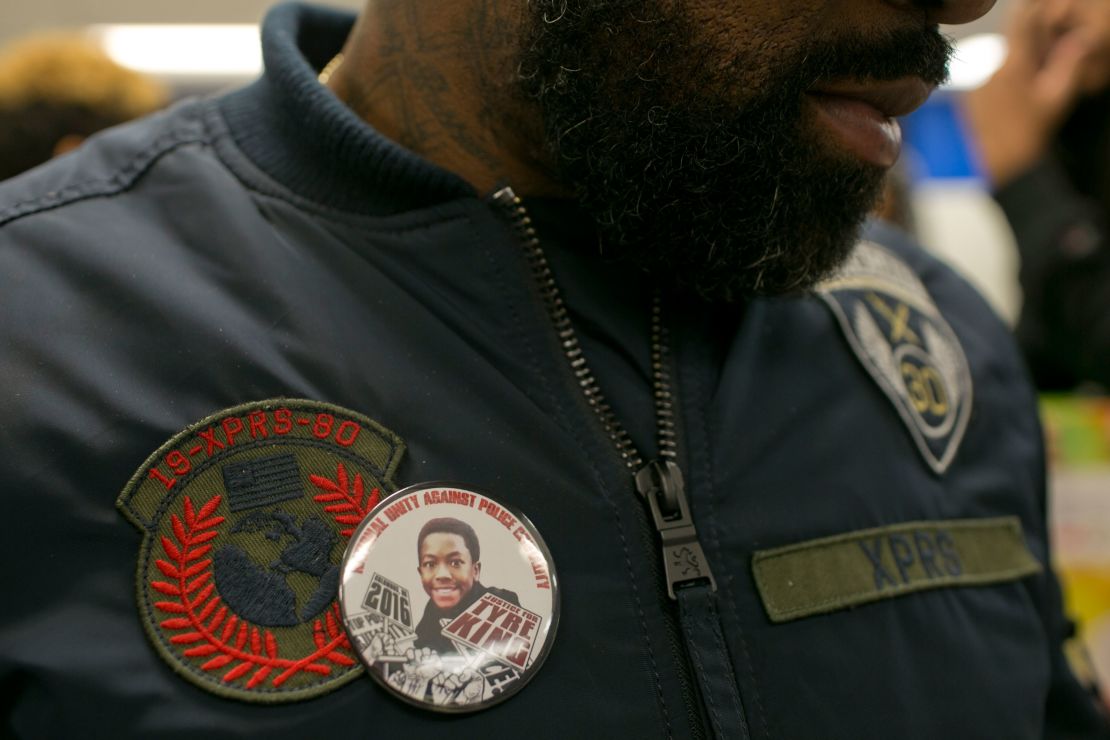
Many city and police officials don’t want to talk, declining to return CNN’s calls or emails. Mayor Andrew Ginther wouldn’t discuss pending suits but said Shaw faced retaliation despite going through proper channels, while Moore received a written reprimand.
“This case represents the status quo and the past. It cannot represent our future and underscores the need for civilian oversight and independent investigations,” Ginther said.
Of the department at large, his office said, “We know that systemic racism exists, not just in Columbus Division of Police but in every aspect of our community. Mayor Ginther is committed to rooting it out.”
Days after approving the Shaw settlement, Councilwoman Priscilla Tyson told CNN, “If we are going to reimagine our police force, we really have to deal first and foremost with racism.”
Slurs and the alleged death threat
In an email, Moore called the allegations against him untrue but said he wasn’t authorized to speak to the media. The city attorney, two police spokespeople, three local union leaders nor the police chief responded to requests for comment. State union leaders referred questions to the local union.
According to a September 2014 internal memo to CDP leadership, Detective Wes Sorrell alleged Moore, his supervisor, was upset Cornett hadn’t been disciplined for an email that Moore found offensive.

Moore referred to Sgt. Douglas Williams and Cornett by the N-word and said, “I need to take their monkey asses out back and kill them,” says the memo, which Williams authored. When Sorrell questioned why Moore was angry with Williams, Moore replied, “If that monkey had taken care of the other monkey, this would have been taken care of,” the memo says.
Cornett had served as Shaw’s partner for more than 20 years. The day before Shaw applied for a narcotics post that would report to Moore, he was approached by internal affairs.
He had not heard Moore make derogatory comments, he told investigators, but he believed Moore had tried to scuttle one of his investigations because he is Black. He also had secondhand information Moore used racial slurs, “made racial jokes,” and threatened to kill Cornett and Williams and put a tracking device on Cornett’s car, according to Shaw’s settled lawsuit. Cornett and Shaw also felt Moore had declined to give the best equipment to Black officers, they told CNN.
Later, in text messages, Moore referred to Shaw’s and another Black officer’s cooperation with internal affairs – to which he shouldn’t have been privy – and blasted a third officer for playing both sides, the lawsuit said.
“He s**t on me and my team. That’s worse than what the brothers did. I expect that out (of) them,” Moore texted, according to the lawsuit. He then warned that Shaw and two other officers “better not take my job,” referring to the narcotics post, the lawsuit says.

Moore later told internal affairs that “brothers” referred to Sorrell and other officers, who called themselves “brothers in Christ,” but an investigator “did not find this explanation to be credible and thought … that it was a racial reference,” the lawsuit says. Sorrell told CNN he had never referred to himself or coworkers as “brothers in Christ.”
During the investigation, Moore said Shaw had accused him of being racist and “all this nonsense,” and he didn’t understand why Shaw would want to work for him, the lawsuit says.
“I probably had a few beers in me, and I was a little angry and upset and probably said some things I shouldn’t have – I mean, clearly,” the lawsuit quotes Moore as saying.
Sergeant terminated, but only briefly
Sorrell, who is White, also reported Moore was misusing CDP equipment and bilking the city for time he hadn’t worked. A 2015 internal affairs summary found Moore had misused equipment, was deceptive with investigators, filed bogus overtime slips, used racially derogatory language, disobeyed an order and failed to “fairly and equitably” fill the narcotics post – but ruled the allegation of threatening Cornett and Williams was “not sustained.”
Moore was terminated, then reinstated after arbitration almost two years later.
Internal affairs found, too, that Sorrell had misused equipment and failed to report Moore’s misdeeds in a timely manner, the summary says. Sorrell told CNN that Thomas Quinlan – then a deputy chief who was named police chief last year – had warned him if he pursued his complaint, he’d face allegations of failing to report Moore in a timely manner.
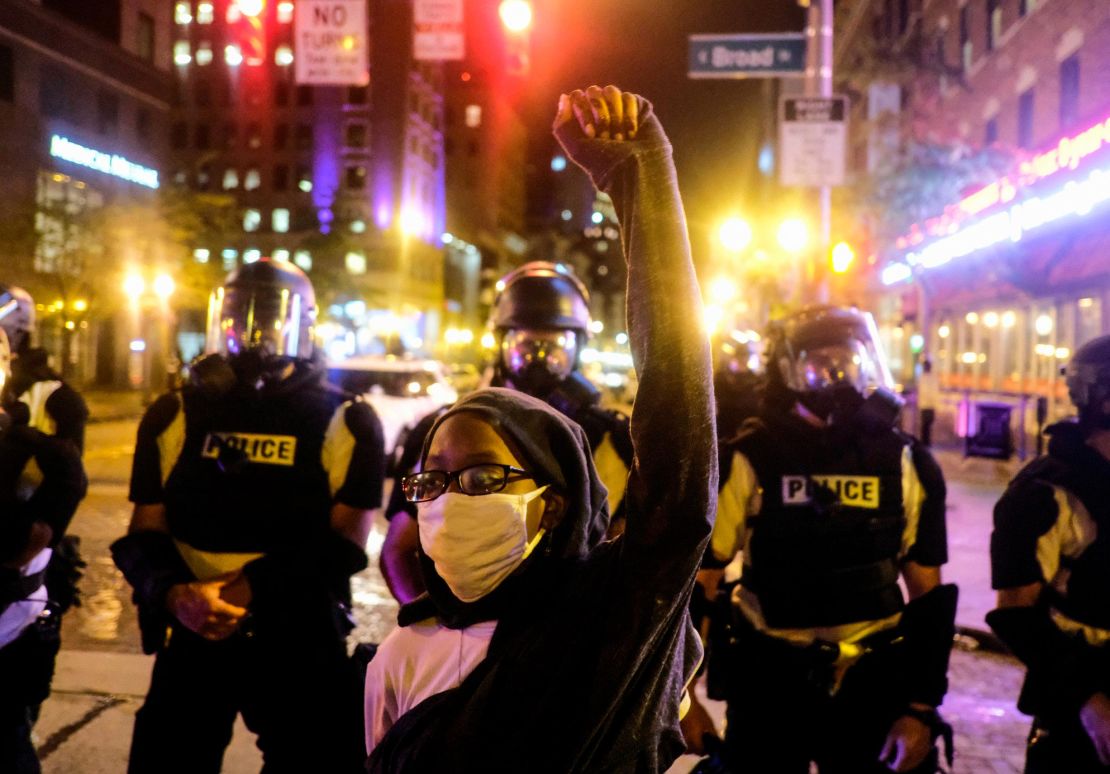
Sorrell’s badge and gun were taken – an act of retaliation for speaking out, he said. He spent his last three years at CDP head down, trying not to attract attention. Colleagues treated him like a snitch, he said. When retirement day came, he leapt at the opportunity.
“If you come forward about stuff, they’re going to find something about you and attack you,” Sorrell said. “The whole atmosphere at Columbus police, in my 25 years there, it is a really big deal to report somebody, another officer. It’s pretty much known that if you do that, you’re going to be the rat and it’s not going to go well for you.”
The episode left Sorrell and his wife so dismayed, they left Columbus for North Carolina. Sorrell filed a lawsuit against the CDP, but it was dismissed last year.
“My whole career was stained and soiled, and I retired right at 25 years. I could’ve stayed,” the 50-year-old father of three said. “I knew that if I stayed there, they were going to get me, going to try and find something to write me up on some technicality, some accusation that would cause me to lose my retirement.”
Shaw staying around to fight
Discrimination and retaliation are so rampant in CDP that Shaw says he wouldn’t have accepted his six-figure settlement without the city reclassifying discrimination as a fireable offense. City Council members approved the payout and policy change after Solicitor General Richard Coglianese said the city faced “a much higher ultimate damage award” if Shaw opted to go to trial.
Now on the eve of his 28th year with CDP, Shaw could have retired years ago, especially when one considers the danger that comes with his drug and human trafficking work.
“Moore could get him killed in a snap of a finger,” Shaw’s attorney, Fred Gittes, said. “You’re going into situations where you can’t carry a gun because you’re going to be searched because you’re working undercover and (fellow officers) provide the backup.”

The lawsuit wasn’t about money, Shaw said. He wants to help the many honest, young CDP officers who fear the retaliation they see meted out to others. They rightly worry about losing lifelines, said the father of five who’s engaged to marry his girlfriend of six years.
“I stuck around just to prove a point that they weren’t going to run me off. I think it hurts them sometimes that I come to work every day and do my job,” he said.
After the settlement vote in Shaw’s case, Councilwoman Tyson asked Coglianese what would happen to Moore. The solicitor replied, “The division attempted some discipline by giving him a counseling.
“They terminated him over abuse of overtime and equipment. That was overturned by an arbitrator, but because of the collective bargaining agreement, the time frames and the limitations, there is nothing more that can be done.”
Discipline depends on race, ex-officer says
Former officer Kevin Morgan, 47, who is Black, says White CDP officers often get passes when allegations are sustained. Black officers tend to get hammered, he said.
Morgan was relieved of duty then fired in 2015 for allegedly accepting pay for shifts he hadn’t worked. The veteran patrolman denied the allegations, and a prosecutor declined to pursue the case against Morgan, saying, “There was no way to disprove any claim by Officer Morgan that he had, in fact, worked other days and hours,” his federal lawsuit says.
While under investigation, Morgan was placed in “580,” where Sorrell spent two months after his fall from favor. It’s a sort of purgatory for accused and injured officers. During his 21 months there, he said, Morgan learned of White officers accused of far worse than he, including a lawman who, outside his jurisdiction, pulled his gun and badge on a man who dinged his wife’s car door. The officer pleaded guilty to attempted unlawful restraint and paid a $50 fine.
“If it was someone of my color, they’d have hung. It’d been over with,” Morgan said.
Morgan’s lawsuit cites two sergeants who were paid without working, an officer who lied about working from home, an officer who submitted bogus leave slips and an officer who left his post for “a great deal of time” over a year. The White policemen were suspended or forfeited leave; none was fired like Morgan, the lawsuit says.
In its motion for summary judgment, the city says the comparisons of misconduct in Morgan’s suit are not apt. Morgan was properly terminated, the motion says, because “a person who steals money from private employers and lies about his record-keeping does not belong anywhere near a gun and a badge.”
Good officers fear speaking out, Morgan said. They’re afraid to lose their paychecks and pensions, some of the best in Ohio law enforcement. Morgan and his wife, who have six kids, lost the home they’d been renting to own for five years. He blew through his retirement savings in 10 months of unemployment, he said, and now works as a hospital security guard.
“It was hell,” he told CNN. “I would just like to be made whole, like I never left. Treat me the same way you treated those officers – those White officers.”
‘Walking the Thin Black Line’
Lt. Melissa McFadden is the CDP’s highest-ranking Black woman, one of two Black women holding her rank, and has spent the last two years waging a public battle against her employer. She was fighting on the low before that, she told CNN.
She’s written a book filled with anecdotes and statistics, earning her friends and enemies – not that she’s worried about the latter. She was green, still in training when she first called out a fellow officer for conducting illegal searches 23 years ago. She’s used to being persona non grata, she told CNN.
“Not only did I learn that I would be resisting a rampant coverup culture, but I was also forever tagged as the poster child for going against the status quo,” she writes in “Walking the Thin Black Line.”
She’s faced petty name-calling and bogus allegations since joining the CDP and has become fearless in filing grievances, she said. The crux of her 2018 lawsuit stems from helping another Black woman who felt a White sergeant was discriminating against her.
In March 2017, several months after assisting with the officer’s grievance, McFadden learned her White commander was asking officers to file complaints against her, she said. At least four obliged, making unfounded allegations about acts of discrimination – ranging from a few months to 10 years prior, but none was punished like Sorrell for delays in reporting, McFadden said.
An investigator ruled “none of the allegations could be proven individually, but when taken together they were true,” she wrote, and McFadden was stripped of her supervisory role and placed in the property room where she was ordered to re-outfit about 1,000 old bulletproof vests and remove insignias from old uniforms – an assignment “well beneath my training and capabilities,” she wrote in her book.
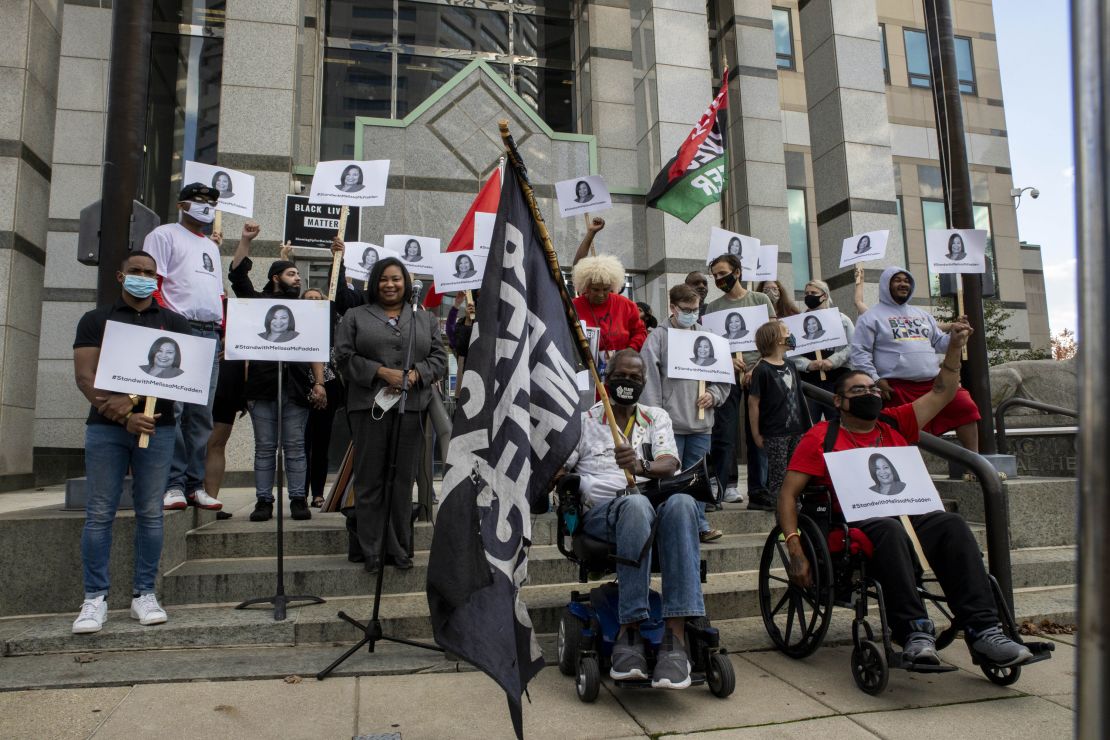
“It felt like I had gotten to the top of the mountain and figured out how to hold them accountable for their discrimination. I had even helped others along the way. And then, like an avalanche, I was back at the bottom – the property room,” she wrote.
She was stacking vests in June 2017 when she tore her rotator cuff and blew two discs in her neck, she wrote. While on leave, the investigation continued. In May 2018, the police chief recommended she be fired. Local media procured an internal affairs report alleging McFadden had created a hostile workplace and embraced a “black militancy mindset.” The lieutenant filed her lawsuit the following month.
McFadden was cleared, with no discipline, and had her supervisory duties restored, but she continued to encounter retaliation, she wrote. The conflict between protecting Columbus’ communities of color from police mistreatment while facing police mistreatment herself still vexes her, she told CNN.
In denying her claims, the city says McFadden failed to exhaust administrative remedies, filed suit after the statute of limitations and failed to identify a policy or procedure that violated her rights.
“The Defendant acted in a proper and non-discriminatory manner toward the Plaintiff,” the city’s legal response said. “The Defendant acted appropriately and had legitimate non-discriminatory reasons for the manner in which it treated the Plaintiff.”
Officers revel in brutality, lieutenant says
“Walking the Thin Black Line” culminates with the May protests that erupted after police killed George Floyd in Minneapolis.
She describes a CDP that was unprepared, lacking basic implements such as shields and flex cuffs – but flush with pepper spray, until officers exhausted the division’s supply – and several officers who were more bent on “brutal attacks on citizens” than they were keeping peace.
Amid “the extreme show of brutality waged against peaceful protesters,” she wrote, City Council President Shannon Hardin and Congresswoman Joyce Beatty, both Black, were pepper-sprayed “to the apparent delight of some of the officers,” McFadden wrote.
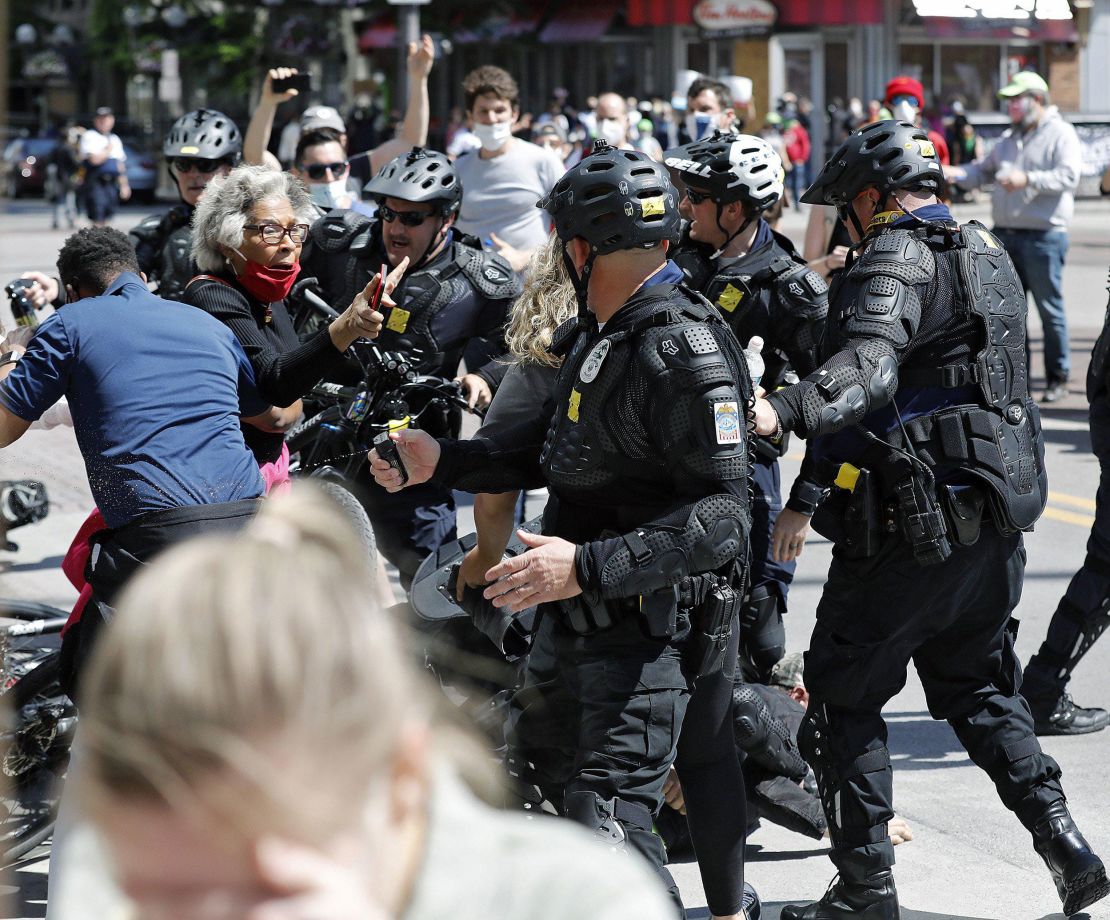
She’s referring to a screengrab from a private Facebook group for CDP officers. She’s not a member because “they know I would not tolerate this type of dialogue,” she writes, but a friend passed it along.
In it, an officer says “f**k” Hardin, Beatty and Gov. Mike DeWine, while wishing “a fist up the ass for (Mayor) Andy Ginther,” to which a fellow officer replies, “Very well said.” Another group member writes, “I suppose Idiot Beaty, Harden would rather have had a nightstick wrapped around their skulls instead of mace, these people are a friggin joke.”
McFadden concludes, “We had all the tools and the power to make that day an amazing experience for everyone working to eradicate racism in the world. But instead we trotted out our best version of racist aggression and made sure everyone learned exactly how much it persists.”
A long history of problems
As McFadden writes, none of this behavior is new. Black CDP officers have been fighting discrimination for at least four decades. Shaw’s and Morgan’s attorney represented Black officers in a 1978 class action alleging discrimination in promotions, assignments and discipline.
“I know the courage that it takes for an officer to go after the city and the department for racism because of the risks they take personally and their families,” Gittes told CNN.
A federal judge agreed with most of the class’ claims in 1985, ordering the defendants were “permanently enjoined from discriminating on the basis of race in the operation of the Columbus Division of Police.” Following the ruling, the number of Black officers tripled, to more than 300, but the remedies didn’t endure: Last year, fewer than 200 of the city’s 1,878 sworn personnel were Black, an annual report says.
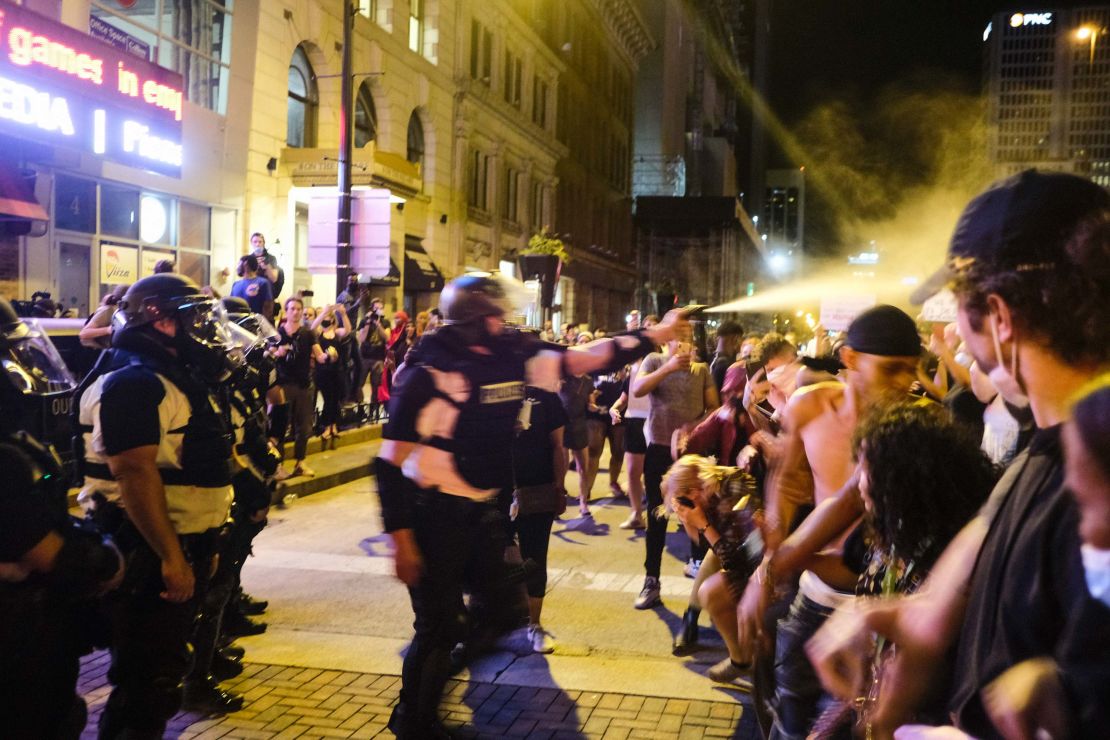
By 1996, the US Justice Department had launched a CDP probe. The department filed a lawsuit in 1999, alleging officers engaged in a “practice of excessive force, false arrests and illegal searches.”
Then-Acting Assistant Attorney General Bill Lann Lee wrote that “victims frequently are African American, or are young, female, or lower income whites,” and that officers “many times have a history of complaints” and lie to their superiors, “changing the facts to portray the victim as responsible for the arrest, the use of force, and/or the search.”
The city and feds reached a 2002 resolution after then-Mayor Michael Coleman promised a new citizen complaints procedure, enhanced use-of-force rules, a commitment to prohibit racial profiling and the installation of cameras in police cruisers.
Still, problems plague the division. An operational review of the CDP found that 51% of officers had experienced discrimination at some point, a mayoral spokeswoman told CNN. The city has launched a commission to look at the division’s policies and procedures.
A third-party review last year also found residents felt police discrimination was a problem in Columbus’ communities and that most Black residents feel the CDP doesn’t take complaints seriously, the mayor’s office said.
‘They’ve been getting away with nonsense’
Given the CDP’s history, Cornett and McFadden are low on hope, they say. Cornett lives in Texas, and he’s still so shaken by the alleged death threat and his supervisors’ ambivalence that he never keeps a phone number long, for fear it’s being tracked.
“We’re still terrified every single day. Every single day, my wife knows she best carry that weapon when she leaves the house,” he said. “It’s just a vicious game, man.”
McFadden added, “The cover-up culture is real,” and until CDP leaders are held to account, nothing will change – but she intends to keep fighting, for her Black counterparts and those they serve.
“They can discriminate against me, and I’m inside. They’re not going to have any sort of worry about the citizenry,” she said. “We need to defund the police and demilitarize police. We need to have a community service approach when it comes to our academy. I’m going to tell them all the things we need. … They’ve been getting away with nonsense here in this department.”
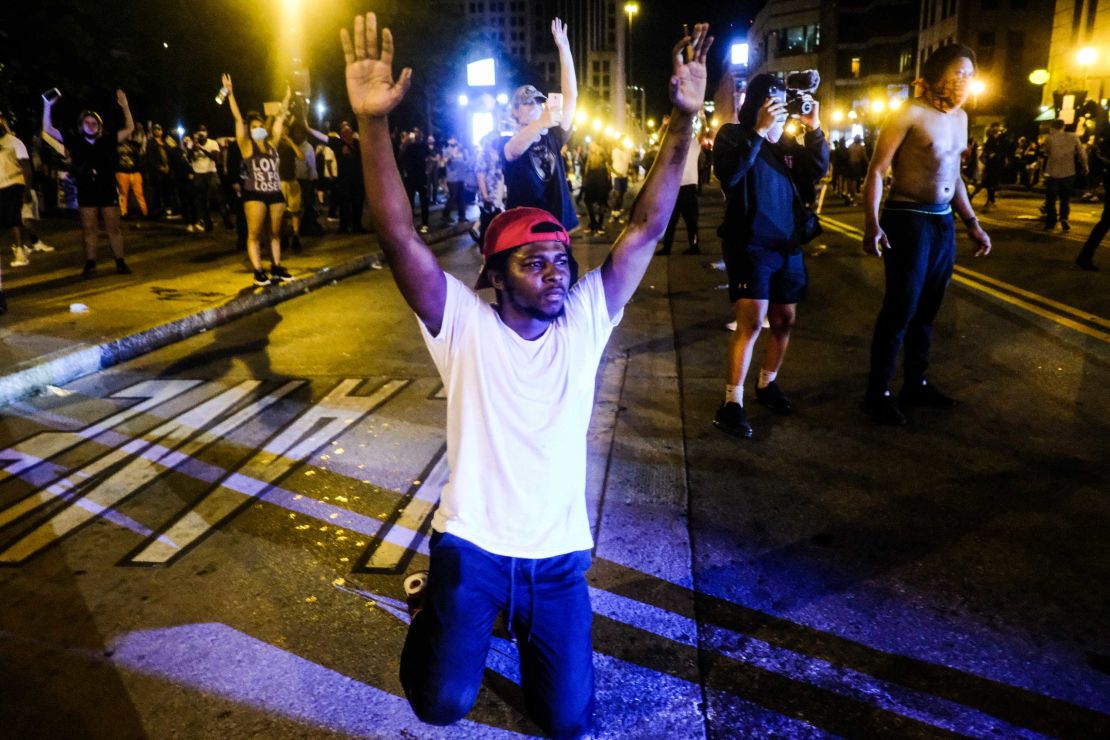
One path to change, McFadden said, is creating a department that mirrors the community it serves. The city is 60% White, yet its law enforcement personnel are 87% White and recruits are 79% White, a 2019 annual report says.
Public safety director Ned Pettus told the City Council last month his department is “laser-focused on increasing diversity,” and the most recent cadet class is predominantly women and minorities. In an email to CNN, he said he has delivered an unambiguous message to police and the public that “there is no room for racism here,” and he touted new protocols for discrimination complaints that allow officers to bypass chains of command and take them directly to his civilian assistants.
“Standing against racism is not enough. We must also fight it on every front. That begins with acknowledging it where it exists, and unfortunately it is everywhere, including the Division of Police,” he told council members. “Racism is a systemic issue that we have up to now failed to eradicate from society. There are elements and vestiges of it everywhere. To think that it’s a problem in everyone else’s house but not ours is just not being honest.”
This story has been updated to include comment from public safety director Ned Pettus.



